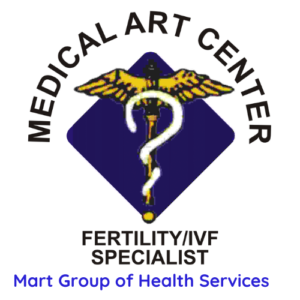Our SERVICES
At Medical Art Center, our services go beyond just In Vitro Fertilization (IVF) and Intracytoplasmic Sperm Injection (ICSI). Listed below are some of our specialized services:
- Evaluation & Counseling to identify the cause of infertility
- Intrauterine Insemination (IUI) is a cheaper and less invasive alternative to IVF which is ideal for women of 30 years old but no older than 35 years
- In Vitro Fertilization (IVF) / Micromanipulation (ICSI)
- Cryopreservation for preservation of sperm, eggs and embryos
- Surrogacy service providing egg and embryo donation
- Pre-implantation Genetic Testing (PGT) to screen out abnormal embryos, for family balancing and to screen for genetic diseases such as sickle cell anemia
- Hysteroscopy: Is a non invasive out patient procedure to screen for physical abnormalities in the uterus that may cause infertility
- Testicular Sperm Aspiration (TESA): A procedure to collect sperm from the testicles in cases of low sperm count
- Antenatal care
- Menopause and Andropause management (HRT)
ASSISTED REPRODUCTION AT MART
According to the World Health Organization, “Infertility is a disease of the reproductive system defined by the failure to achieve a clinical pregnancy after 12 months or more of regular unprotected sexual intercourse.” Millions of people (about 10% of the world’s population) suffer from infertility and this number is growing.
At Medical Art Center, our outstanding team of physicians, nurses and embryologists, who are well versed in the latest innovations in treatment, will give you the optimum results you deserve and the freedom to have your dream family.
Hundreds of couples have gone through this procedure at our clinic and have achieved their dreams of starting a family. The staff at Medical Art Center is among the most experienced in the country and our success with assisted reproduction keeps growing every day.

WHAT EXACTLY IS IN-VITRO FERTILIZATION?
IVF is the process of fertilization by extracting eggs, retrieving a sperm sample, and then manually combining an egg and sperm in a laboratory dish. The resulting embryos are transferred back to the uterus. The techniques involved in IVF mimic the same process of conception that occurs naturally in a woman’s body.
WHAT TO EXPECT DURING IVF TREATMENT
During IVF, the follicles in the ovaries of a woman are stimulated to produce multiple eggs under continuous monitoring. Once these follicles are the right size and maturity, egg collection is scheduled.
To prepare for the procedure, the woman is placed under mild sedation. This will enable the doctor to extract eggs easily without any discomfort to the patient. Egg collection occurs under ultrasound guidance using a fine aspiration needle.
On the same day, the man produces a semen sample for fertilization. Recovery time is fast. Once the mild sedation wears off, most patients can resume normal activities within 24 hours of their procedure. Embryo transfer takes place 3 or 5 days after egg collection and followed by a pregnancy test.
ADVANCES IN ASSISTED REPRODUCTION
New advances in ART are giving patients the opportunity to achieve even better results. Medical Art Center offers PGT for patients who are at risk of transferring inherited genetic disorders to their unborn children.
PGT is also used to detect chromosomal abnormalities in embryos before they are transferred. We are also pleased to offer gamete (sperm and egg) donation, cryopreservation and surrogacy services.
REGISTRATION AND HISTORY
When you register into our IVF program, your medical history and all other necessary information will be taken by a nurse before you are assigned a primary physician.
PRE IVF TESTING
You and your significant other will be required to undergo basic blood screening tests. The female will go through hormone profiling and an ultrasound scan to check the ovaries and the uterus.
A special procedure called Hysterosonogram (HSN) must be done as well. This procedure is conducted using a catheter with a balloon; it helps visualize the endometrium, which is the space in the uterus where your baby will grow. Your male partner will have his semen analyzed. Your assigned physician will review all results and necessary actions will be taken as needed.
PREPARING FOR IN-VITRO FERTILIZATION TREATMENT
Once you and your partner have decided to proceed with IVF, you will meet with one of our experienced physicians who will thoroughly evaluate your case, recommend a specific treatment, and schedule your procedure. Our caring and diligent nurses are available to review all pre-operative instructions, medications and required paperwork.
MEDICATIONS
Medications and their protocols for use will be discussed with you during your cycle calendar review. We have taken out the added stress of purchasing medications for you, thereby making it readily available as part of your treatment plan. Your doctors will explain what each medication is, how it works, how to administer it and when to administer.
FINANCIAL POLICY
All payments are due and must be paid in full prior to your procedure. A payment plan can be discussed with our account team before you proceed with your treatment. We are in partnership with some financial institutions that can facilitate loans to cover the cost of your treatment.
IN-VITRO FERTILIZATION (IVF) PROCESS
The IVF process takes about 4-8 weeks from patient registration to embryo transfer. There are five (5) basic steps in the IVF and embryo transfer process.
STEP 1 – Administering fertility drugs to stimulate ovaries to produce eggs. Multiple egg production is the goal because not all eggs will fully develop or fertilize after retrieval. A transvaginal ultrasound is used to examine and monitor the ovaries routinely during this time of egg recruitment. At the appropriate time, more medication is given to complete maturation of eggs and trigger ovulation.
STEP 2 – Egg Collection – Eggs are retrieved through a minor surgical procedure that uses ultrasound imaging to guide a hollow aspiration needle through the pelvic cavity to remove the eggs. This procedure takes about 10 to 20 minutes.
STEP 3 – Sperm collection – The male produces a fresh semen sample, which is prepared for insemination. If the man is unavailable on the day of egg collection, a frozen sample can be used instead. This means that a sperm cryopreservation procedure had been scheduled before IVF.
STEP 4 – Insemination – The sperm and eggs are mixed together and stored in an incubator to promote fertilization. In cases where the probability of fertilization is low, a process called intra cytoplasmic sperm injection (ICSI) whereby a single sperm cell is injected into a single egg is performed. Eggs are monitored to confirm fertilization and cell cleavage.
STEP 5 – Embryo transfer – Embryos are typically transferred into the woman’s uterus three or five days after egg retrieval and fertilization. Under ultrasound guidance, a catheter containing the selected embryos is inserted into the uterus where the embryos are deposited. This process takes about 5 minutes and is usually painless. However, some women experience mild discomfort.
AFTER IVF
Although you have to rest after transfer, most women can resume normal activities the next day. If the procedure is successful, implantation typically occurs around 6 to 10 days following egg retrieval. Pregnancy blood tests are performed 12 days after embryo transfer. If you have a positive pregnancy test, we will provide high-risk obstetric monitoring (to prevent early pregnancy loss) until the first trimester is over.
We can also facilitate your referral to an obstetrician of your choice or our in-house obstetrician in our sister clinic (MART Medicare) for continued antenatal care and delivery. If you have a negative test, you will be scheduled for an appointment with the Medical Director to review your cycle and plan the next phase of management.
MANAGEMENT OF ASSOCIATED CONDITIONS
Obesity and lifestyle modification: Obesity can affect fertility by causing hormonal imbalances and problems with ovulation. In men, it can also be associated with abnormal semen parameters and erectile dysfunctions. Lifestyle modification is advised to increase the chances of pregnancy. Critical lifestyle modifications can be taken care of at our sister company Mart Life Detox Clinic.

TREATMENT OF FEMALE REPRODUCTIVE CONDITIONS
We manage several female reproductive issues, including endometrioma, adenomyoma, polyps, fibroids, hydrosalpinx, and polycystic ovarian syndrome. In addition, we support women who have experienced repeated IVF failures. When such patients complete a Mayr detox program, their success rates often improve remarkably in subsequent IVF cycles.
In fact, our research—presented at the International Federation of Fertility Societies Conference in India (2016)—demonstrated that combining detox programs with ART treatments leads to better overall outcomes
DELIVERY OF BABIES
Our Obstetrics and Gynecology unit ensures safe delivery from conception to the first 1,000 days of your baby’s life. Moreover, we provide comprehensive care for both mother and child, supporting every stage of development and well-being. Consequently, families who choose Medical Art Center enjoy consistent, compassionate, and professional care throughout the entire journey.

